Methylation is a crucial biochemical process that affects numerous aspects of our well-being, including mental health.
In the simplest terms, methylation involves the transfer of a single carbon and three hydrogen atoms (a methyl group) from one substance to another. This process is pivotal in regulating gene expression, synthesizing neurotransmitters, and managing homocysteine levels in the body. Such neural functions make methylation a significant area of interest for understanding psychological health disorders and the varying responses to psychiatric treatments.
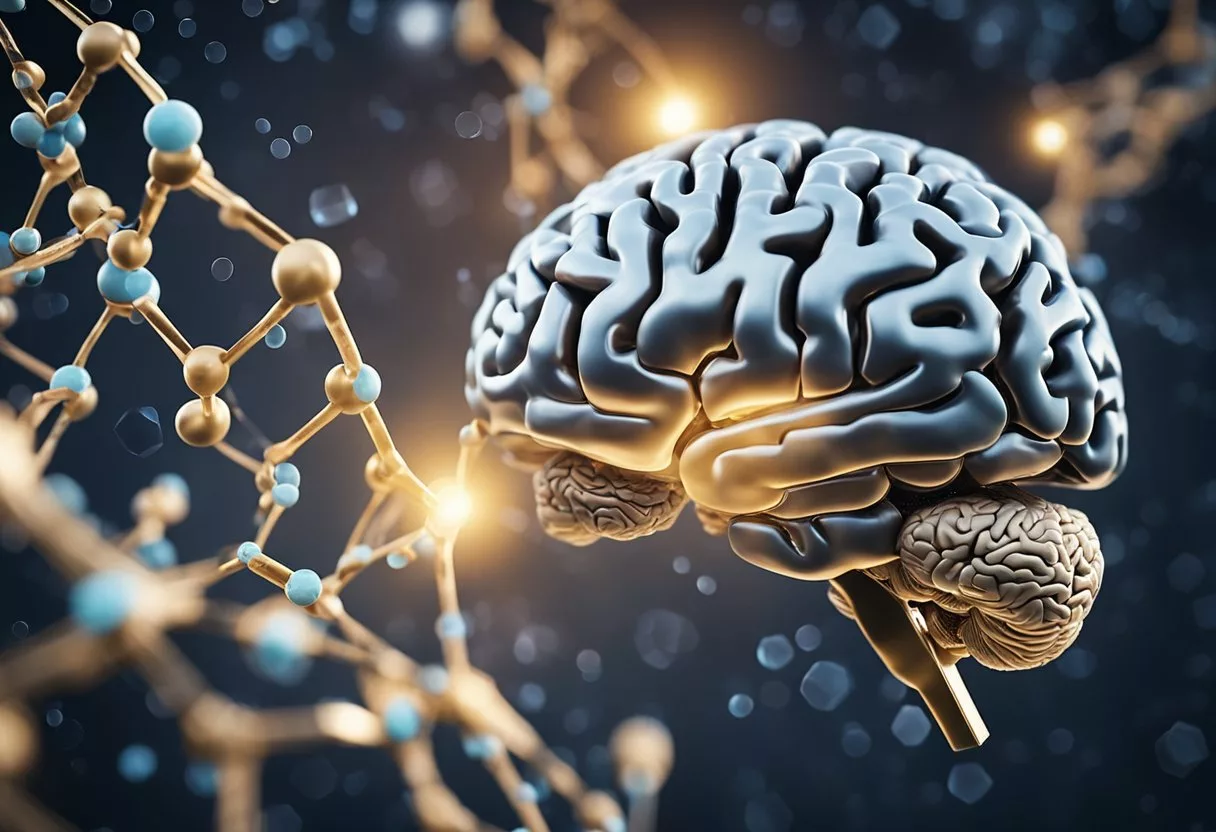
Given the impact of methylation on neurotransmitter production, the process directly influences mental health. Neurotransmitters like serotonin, dopamine, and norepinephrine, which are vital for mood regulation, are synthesized with the aid of methylation.
Imbalances in methylation can lead to atypical levels of these neurotransmitters, possibly contributing to conditions such as depression, anxiety, and bipolar disorder.
Research recognizes the need to examine individual methylation patterns to potentially tailor more effective mental health interventions.
Key Takeaways
- Methylation is an essential biochemical process influencing brain function and mental health.
- Imbalances in methylation can affect neurotransmitter levels, contributing to mental health disorders.
- Understanding individual methylation patterns may aid in developing personalized mental health treatments.
The Role of Methylation in Mental Health
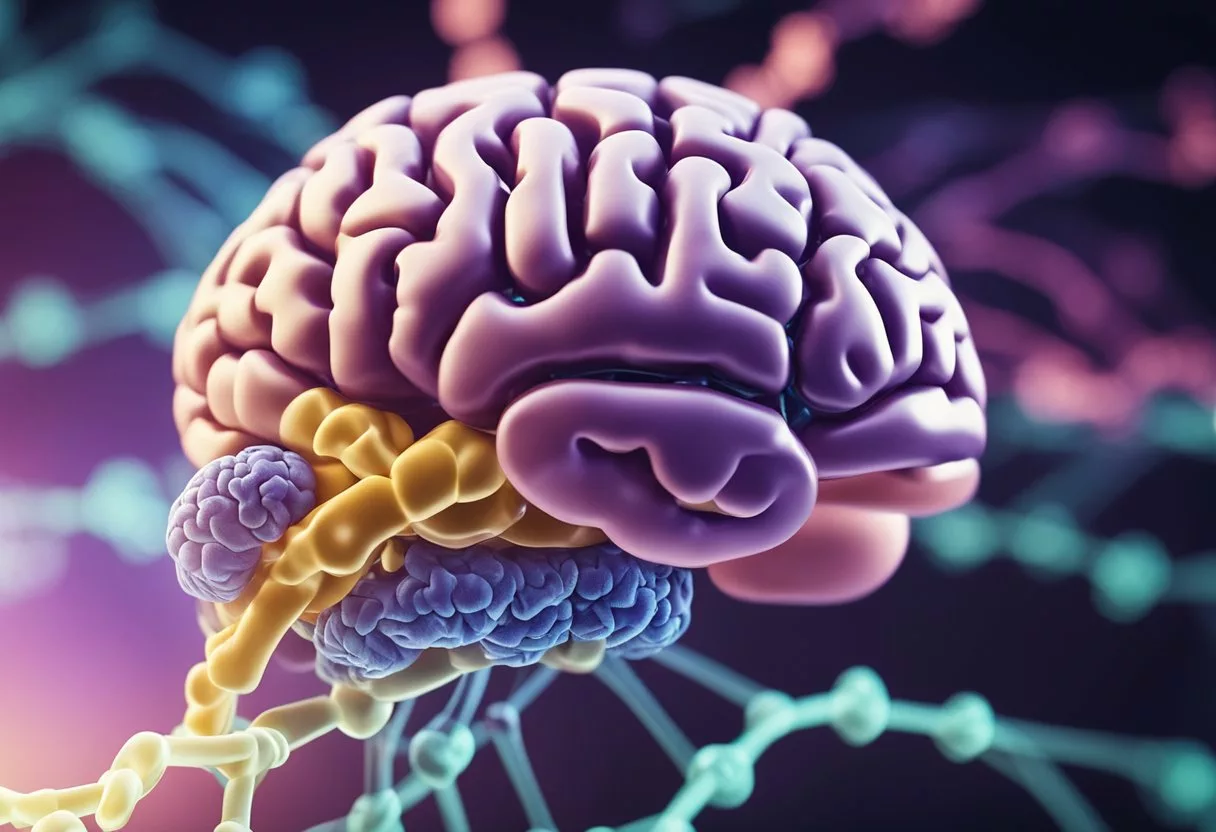
Methylation processes are tightly linked to mental health through their role in gene expression and neurotransmitter regulation. This section explores the mechanisms by which methylation influences mental health.
Basics of Methylation
Methylation involves the addition of a methyl group (a carbon atom with three hydrogen atoms) to molecules within the body. This biochemical process is crucial for a variety of cellular functions, including epigenetic regulation.
In the brain, methylation affects the availability of neurotransmitters such as serotonin, dopamine, and norepinephrine, which play key roles in mood regulation and cognitive function.
Methylation and Gene Expression
Gene expression in the context of mental health can be profoundly affected by methylation. The addition or removal of methyl groups can activate or silence genes.
These modifications do not change the DNA sequence but instead influence the way genes are expressed. For instance, altered methylation patterns have been linked to variations in the expression of genes that regulate stress responses, which may affect an individual’s susceptibility to mental health disorders.
Methyl Donors and Their Importance
Methyl donors are compounds that can transfer a methyl group to a target molecule. Nutrients like VitB12 and folate are key methyl donors involved in one-carbon metabolism.
They are crucial for the synthesis of S-Adenosylmethionine (SAM), which is the principal methyl donor in the body. Adequate levels of these nutrients are essential for proper methylation processes and, consequently, for maintaining mental health.
Genetic and Nutritional Influences

This section explores the intricate relationship between genetics and nutrition, particularly focusing on how folate, one-carbon metabolism, and specific genes such as MTHFR can impact mental health.
Folate and One-Carbon Metabolism
Folate, a B vitamin also known as B9, is crucial in the one-carbon metabolism pathway that generates S-adenosylmethionine (SAM), a methyl donor essential for DNA methylation. This process is vital for proper neurodevelopment and gene expression.
Inadequate folate intake or disruption in its metabolism can lead to alterations in methylation patterns, affecting mental health.
Folic acid, the synthetic form of folate, along with vitamin B12, methionine, choline, and betaine contribute as methyl donors or cofactors in one-carbon metabolism, emphasizing the need for a balanced intake of these micronutrients.
Influence of MTHFR Gene
The gene encoding methylenetetrahydrofolate reductase (MTHFR) is of particular interest in the study of mental health because it influences the efficiency of methylation processes.
Studies suggest that certain variants of the MTHFR gene can reduce the activity of the enzyme, impacting folate metabolism and SAM production. As a result, individuals with these gene variants may require higher levels or specific forms of folate for optimal mental health and are advised to seek individualized dietary recommendations.
Nutrition and Mental Health
Early life nutrition, encompassing maternal diet during pregnancy and offspring diet, has been directly associated with mental health outcomes.
Nutritional status during these critical periods can modulate stress response through epigenetic mechanisms, highlighting the importance of a quality diet rich in B vitamins such as B12 and folate.
Furthermore, the availability of SAM is instrumental in neurodevelopment, where a deficit of nutrients like folate, vitamin B12, and methionine could potentially influence mental health later in life.
Mental Health Disorders and Methylation

Methylation processes in the body play a critical role in the regulation of gene expression and have been implicated in various mental health disorders. This intricate biological mechanism affects the brain’s function, influencing the development and management of mental health conditions.
Depression and Methylation
Research indicates that DNA methylation may contribute to depressive symptoms by affecting gene expression related to mood regulation.
For instance, individuals with altered global DNA methylation profiles have been observed in cases of depression, suggesting a potential biomarker for the disorder. Studies, such as those published in Nature, further reveal that depression could be associated with specific methylation patterns in the human genome.
Anxiety and Stress-Related Disorders
In the context of anxiety and stress-related psychiatric disorders, methylation appears to play a role in how the body responds to stress.
DNA methylation influences the hypothalamic-pituitary-adrenal (HPA) axis, which manages the stress response. Persistent stress may alter the methylation state of genes involved in the HPA axis, potentially leading to dysregulation and the onset of anxiety disorders.
Schizophrenia and Bipolar Disorder
Regarding schizophrenia and bipolar disorder, studies have suggested that there may be a connection with methylation.
For example, a homozygous mutation in the MTHFR gene, which is required for methylation processes, has been linked with an increased risk of these conditions.
The relationship between DNA methylation and gene expression in the brain can influence neurodevelopment and neurotransmitter systems, playing a role in the pathophysiology of both schizophrenia and bipolar disorder, as highlighted by resources like the National Center for Biotechnology Information.
Physiological Effects of Methylation on the Brain
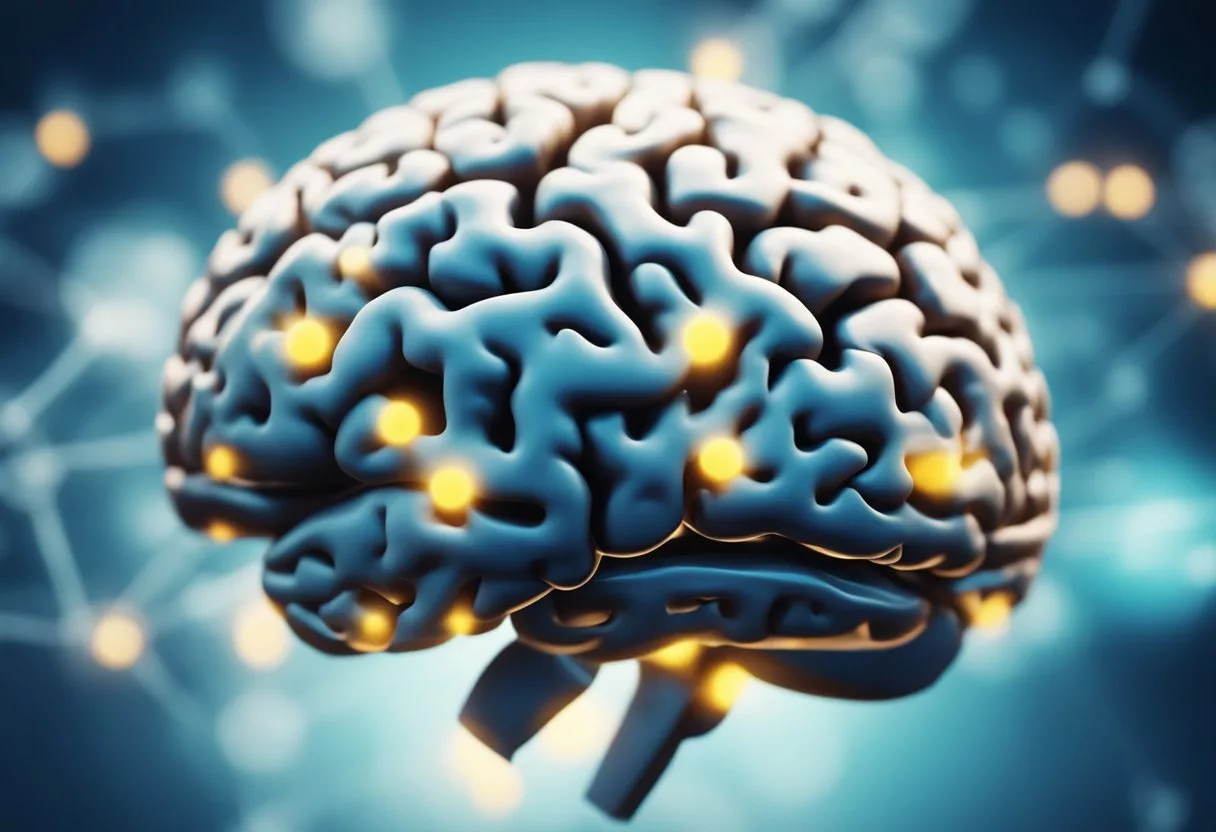
Methylation patterns in the brain directly influence both the structure and function of the nervous system, impacting everything from neurodevelopment to the regulation of neurotransmitters. This relationship is pivotal for understanding various neurological disorders and exploring potential neuroprotective effects through epigenetic mechanisms.
Neurotransmitters and Brain Function
DNA methylation plays a critical role in the regulation of genes that encode enzymes and other proteins involved in the synthesis and metabolism of neurotransmitters such as serotonin, dopamine, norepinephrine, and glutamate.
These neurotransmitters are essential for proper brain function, affecting mood, learning, memory, and cognition. For instance, changes in the methylation of the serotonin transporter gene can affect the availability of serotonin, linking to mood disorders like depression and anxiety.
Neurological and Neuroprotective Effects
The methylation of histones and DNA, two key epigenetic mechanisms, also affects neuronal health. It influences neurodevelopment and the brain’s capacity to adapt to new information or recover from injury.
Aberrant methylation patterns have been implicated in a variety of neurological disorders. However, understanding these patterns can lead to novel ways of enhancing the brain’s neuroprotective effects, potentially leading to new treatments for diseases like Alzheimer’s and Parkinson’s.
Clinical Implications and Future Research
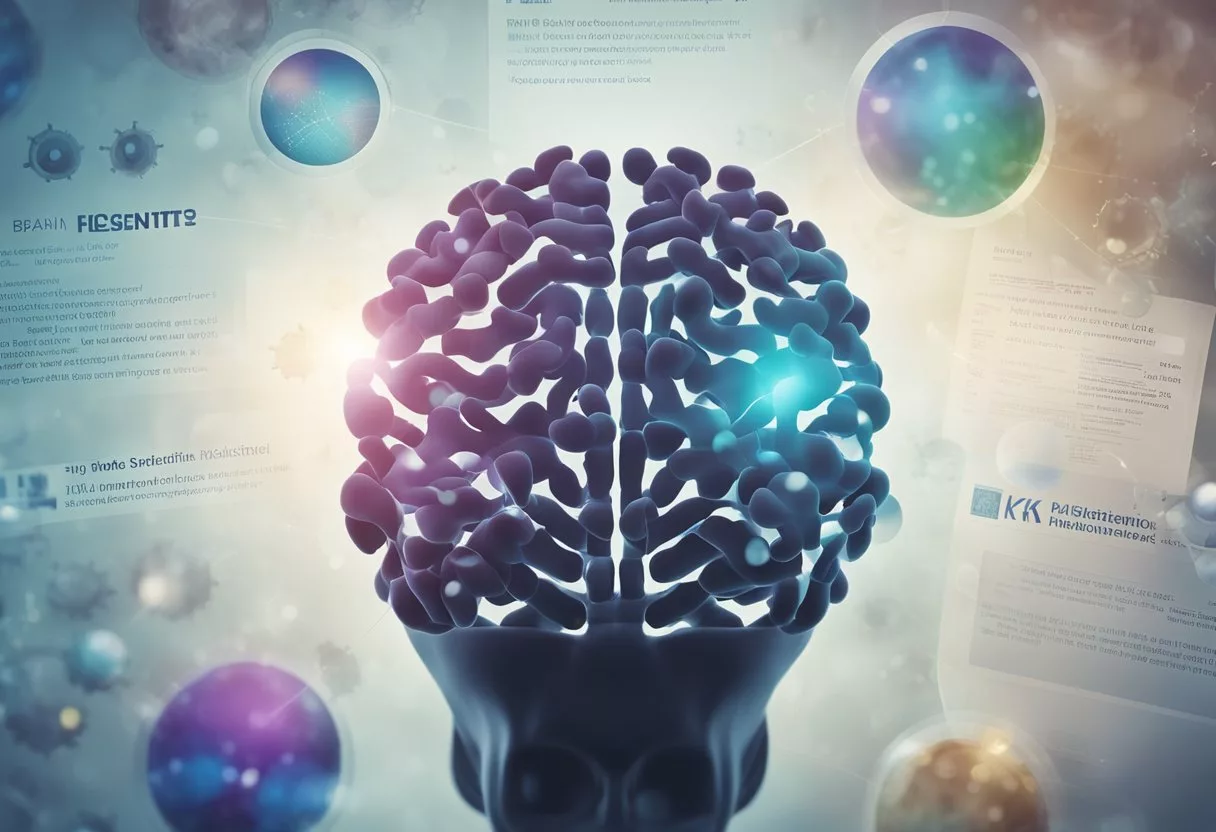
Understanding the intricacies of DNA methylation holds promising avenues for advancements in mental health care. This research intersects crucially with the responsibilities of health professionals in psychiatry and could influence therapeutic strategies as well as provide a foundation for future explorations in epigenetics.
Potential Therapeutic Interventions
Health professionals are increasingly considering the role of epigenetic modifications, such as DNA and histone methylation, in the treatment of psychiatric disorders.
Lifestyle interventions that could potentially alter DNA methylation patterns are being examined for their therapeutic effects. One specific area of focus is the enzyme Methyltetrahydrofolate (MTHFR), which plays a vital role in the methylation pathway.
Aberrant function of MTHFR, due to polymorphisms, could be implicated in altered phenotype presentations in psychiatric conditions. Additionally, targeting S-adenosylhomocysteine (SAH) hydrolase or the catechol-O-methyltransferase (COMT) enzyme, both of which are involved in methylation and phosphorylation processes, may offer novel approaches in the management of such disorders.
Emergent Research in Methylation
Recent studies, such as those exploring childhood maltreatment, highlight the impact of environmental factors on DNA methylation and its subsequent influence on mental health.
Future research is directed toward understanding how these epigenetic changes can act as biomarkers for mental health conditions.
It involves interdisciplinary efforts spanning genomics, psychiatry, and behavioral sciences to map out the complex interaction between methylation patterns and mental health phenotypes.
Furthermore, deciphering how lifestyle factors affect these methylation patterns could lead to predictive and preventive health measures.
Methylation and Other Health Conditions

Methylation processes affect numerous health conditions beyond mental health, involving various body systems and playing a role in the development and progression of diseases.
Vascular and Cardiac Implications
Methylation is a process vital to cardiovascular health. It regulates gene expression involved in endothelial function, which is crucial for the vascular system.
Enzyme activity, including that of methylenetetrahydrofolate reductase (MTHFR), can be disrupted in cases of MTHFR deficiency, affecting homocysteine metabolism.
Elevated homocysteine levels are associated with an increased risk for vascular diseases like vascular dementia and have implications for the overall health of the cardiac system.
Cancer and Neurodegenerative Diseases
On the cellular level, methylation alterations can contribute to the development of colorectal cancer by affecting DNA repair mechanisms.
Wilms tumor, a type of kidney cancer found in children, has also been linked to aberrant methylation patterns.
Beyond cancer, methylation dysregulation is implicated in a spectrum of neurodegenerative diseases, impacting neural function and contributing to conditions such as migraine and neurological disorders.
Additionally, the role of methylation in autism spectrum disorders highlights its impact on neurodevelopment and cognitive function.
Environmental and Lifestyle Factors

Methylation processes in the body are significantly influenced by lifestyle choices and environmental factors. This interplay can directly affect mental health, particularly in susceptibility to stress-related psychiatric disorders.
Lifestyle Impacts on Methylation
Lifestyle choices such as physical activity and diet can modulate gene methylation patterns, which are crucial for regulating mental health.
Regular physical activity has been shown to improve methylation and reduce the risk of psychiatric disorders by modulating neurotransmitter systems like glutamate and reducing reactive oxygen species, mitigating oxidative stress.
On the other hand, sedentary behavior can lead to adverse epigenetic modifications that may contribute to mental health issues.
Environmental Toxins and Detoxification
Exposure to environmental toxins can cause harmful alterations in DNA methylation, potentially leading to neuronal damage and mental health problems.
The detoxification systems, particularly those involving the liver, are paramount in combatting these adverse effects.
For instance, efficient liver function is necessary to process and detoxify estrogen compounds that, if not properly regulated, can negatively affect brain function and mood reactivity.
The body’s ability to handle oxidative stress plays a vital role in coping with reactive oxygen species generated by toxins, with implications for psychological well-being.
Epigenetic Inheritance and Developmental Impact

Understanding how epigenetic factors like DNA methylation affect mental health requires a closer look at the mechanisms behind inheritance and the critical role of developmental nutrition.
Epigenetic Patterns and Inheritance
Epigenetic regulation involves modifications that alter gene expression without changing the DNA sequence itself. DNA methylation and histone methylation are two key processes that contribute to the stable transmission of epigenetic patterns across generations.
For example, the gene IGF2 is subject to epigenetic regulation through DNA methylation, showcasing one way these patterns are preserved through the DNA replication that occurs from parent to offspring.
This heritable epigenetic information can influence neurodevelopment and may impact an individual’s susceptibility to mental health disorders.
Developmental Nutrition and Mental Health
Early life nutrition, particularly maternal diet, plays a significant role in the epigenetic regulation of genes implicated in mental health.
Adequate nutrient intake during pregnancy can affect DNA methylation related to genes such as NR3C1, which encodes the glucocorticoid receptor and can impact the stress response.
Offspring diet is equally crucial, as postnatal nutrition can influence BDNF levels, a critical factor in neural plasticity and function.
Consequently, dietary factors both prenatally and postnatally can leave epigenetic marks that shape neurobehavioral outcomes.
Genetic Polymorphisms and Methylation Pathways

Methylation pathways are crucial for various physiological processes, and genetic polymorphisms in these pathways can significantly influence mental health. Here, we examine common polymorphisms in the MTHFR gene and their impact, as well as other relevant genes and variants.
Common MTHFR Polymorphisms
MTHFR C677T and MTHFR A1298C are two well-documented polymorphisms within the MTHFR gene.
The presence of the C677T mutation can reduce the enzyme’s activity, leading to elevated homocysteine levels, thus potentially affecting mental health. Similarly, the A1298C variant can also influence homocysteine metabolism, albeit through a different mechanism.
- MTHFR C677T: Individuals with this variant may have a reduced ability to convert 5,10-methylenetetrahydrofolate to 5-methyltetrahydrofolate, a key compound in one-carbon metabolism.
- MTHFR A1298C: This polymorphism has been associated with a milder decrease in enzyme activity compared to C677T and possibly with different psychiatric implications.
Other Relevant Genes and Variants
Beyond the MTHFR gene, several other genetic polymorphisms have been implicated in methylation processes relevant to mental health.
- Factor V Leiden (G1691A) and Prothrombin G20210A: These variants are known for their roles in coagulation but also intersect with methylation pathways which may indirectly influence brain function.
- Factor XIII V34L and PAI-1 4G/5G: Both of these genetic variants can affect methylation and have been suggested to influence various physiological processes, including those relevant to mental health, through complex interactions with other biochemical pathways.
Clinical Assessments and Interventions

Clinical assessments and interventions for methylation disorders in mental health require precise diagnosis and targeted treatment strategies. Health professionals need to assess the balance of key biomolecules such as homocysteine and S-adenosylmethionine (SAM) to optimize these interventions.
Diagnosing Methylation Disorders
Accurate diagnosis of methylation disorders begins with the analysis of homocysteine levels, which, when elevated, can indicate a methylation issue.
Measurement of S-adenosylmethionine (SAM), an essential methyl donor in the brain, assists in determining the methylation capacity.
Methylenetetrahydrofolate reductase (MTHFR) gene mutations, which can impact the methylation cycle, are identified through genetic testing.
Health professionals utilize these assessments to determine the need for intervention.
Nutritional and Pharmacological Treatments
Once diagnosed, treatments may include nutritional interventions, such as supplementation with B vitamins to reduce homocysteine levels and support healthy methylation cycles.
Pharmacological treatments might involve compounds that provide methyl groups or influence SAM concentrations directly.
The exact regimen is determined based on individual patient needs and is guided by continuous monitoring and assessment by mental health professionals.
Frequently Asked Questions
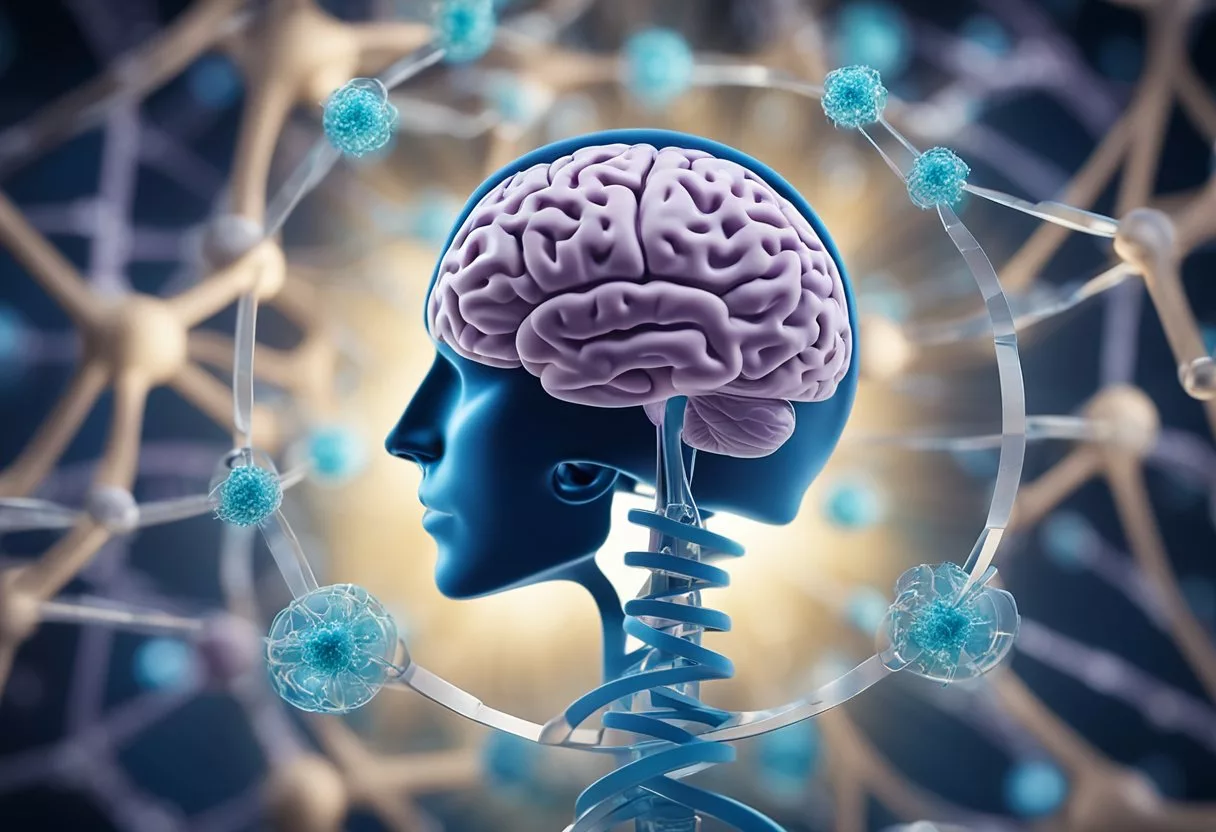
This section delves into common inquiries regarding the relationship between methylation and mental health, aiming to clarify its role and address concerns related to dietary and supplemental support.
How does methylation influence mental health conditions?
Methylation processes, involving the transfer of a methyl group onto amino acids, neurotransmitters, and DNA, can affect various mental health disorders.
Inadequate or improper methylation may lead to imbalanced brain chemistry, influencing mood and cognitive functions.
What are the symptoms associated with methylation issues in mental health?
Symptoms linked to methylation imbalances can include mood swings, depression, anxiety, lower energy levels, and difficulty concentrating.
These can stem from altered levels of neurotransmitters like serotonin and dopamine due to methylation dysfunction.
Which dietary choices can support proper methylation processes?
Choices that include foods rich in folate, such as leafy greens, as well as those high in vitamin B12 and B6, can support proper methylation.
These nutrients are vital cofactors in the methylation cycle and help ensure effective neurotransmitter synthesis and DNA maintenance.
How can one test for methylation efficiency in the body?
Methylation efficiency can be evaluated through specific blood tests that measure compounds such as homocysteine or through genetic testing to identify mutations in the MTHFR gene.
These methods can provide insight into one’s methylation status and capacity.
What supplements are recommended for enhancing methylation?
Supplements that may enhance methylation include methyl-folate, vitamin B12, betaine, and SAMe (S-adenosylmethionine). These are often used in conjunction with a healthcare provider’s recommendation to correct deficiencies and support methylation pathways.
What role does methylation play in brain function and mood regulation?
Methylation is essential for the creation and breakdown of neurotransmitters, crucial for brain function and mood regulation.
It impacts the synthesis of mood-related neurotransmitters such as serotonin and dopamine, which play significant roles in emotional wellbeing and cognitive health.